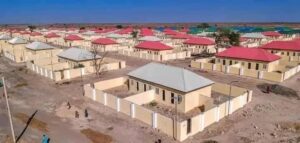Professional bodies seek supervisory role over building construction
Stories by Owoleye Oluwakayode
Architects under the auspices of the Nigerian Institute of Architects (NIA) want the federal government to make it mandatory for its members to supervise building construction as one of the ways of ending building collapse in the country.
The built sector has been faced with frequent building collapse incidents which have claimed many lives.
President of the NIA Enyi Ben-Eboh, who made the appeal during a strategic retreat of the institute in Abuja on Thursday, said the supervisory role would place architects in a position where they would see their designs implemented in physical forms.
“It is worrisome to the Nigerian Institute of Architects and other professionals in the built environment that buildings are collapsing at this age.
“When buildings under construction collapse it speaks volumes about several things. These could be the professionals that are employed to construct these buildings or the quality of materials that are used in constructing the building and also the level of supervision both from the consultants and the regulators and the government agencies that are responsible for checking these buildings to ensure that they are being constructed in conformity with the provisions in the building code.
“So it is of concern to us and part of what we will be discussing at this retreat will be how best to confront the issue because it is not as if there are no laws to govern this sector, but the implementation of the laws is the problem. So, we will restrategise in this retreat on how best we can assist the government in its responsibility of giving approvals for buildings to make sure that the environment under which buildings are erected is such that anybody who doesn’t have business erecting a building should not be in that business.”
He, however, stressed that architects were not involved in building collapse. He explained that when architects finish designing buildings, the owners go ahead and build according to their own dictates.
He, therefore, called on the government to make it mandatory for architects who initiate the building process through designs to supervise the actual construction to ensure that the designs are followed to the letter.
“A lot of these buildings are collapsing, if you check, you will find out that our members are not really involved. What happens is that a lot of clients once they get an architect to design their buildings and they get approval, they just go ahead and build according to their own dictates. Most of the time, they don’t have architects on these jobs. And we want to appeal to the government that it should be mandatory that the job of the architect should not just end with the drawings, they should supervise the implementation of what they designed.
“Oftentimes, you could design a building on two floors and during construction the clients would decide that he wants to add two more floors and the architect is no longer there. He gets a student or somebody else to give him a sketch and when the chips are down and you investigate, you discover that no registered architect will supervise a building that he knows is not stable and that will lead to his licence being withdrawn.”
He said many clients engage in direct labour thereby minimising the role of architects in the construction process.




